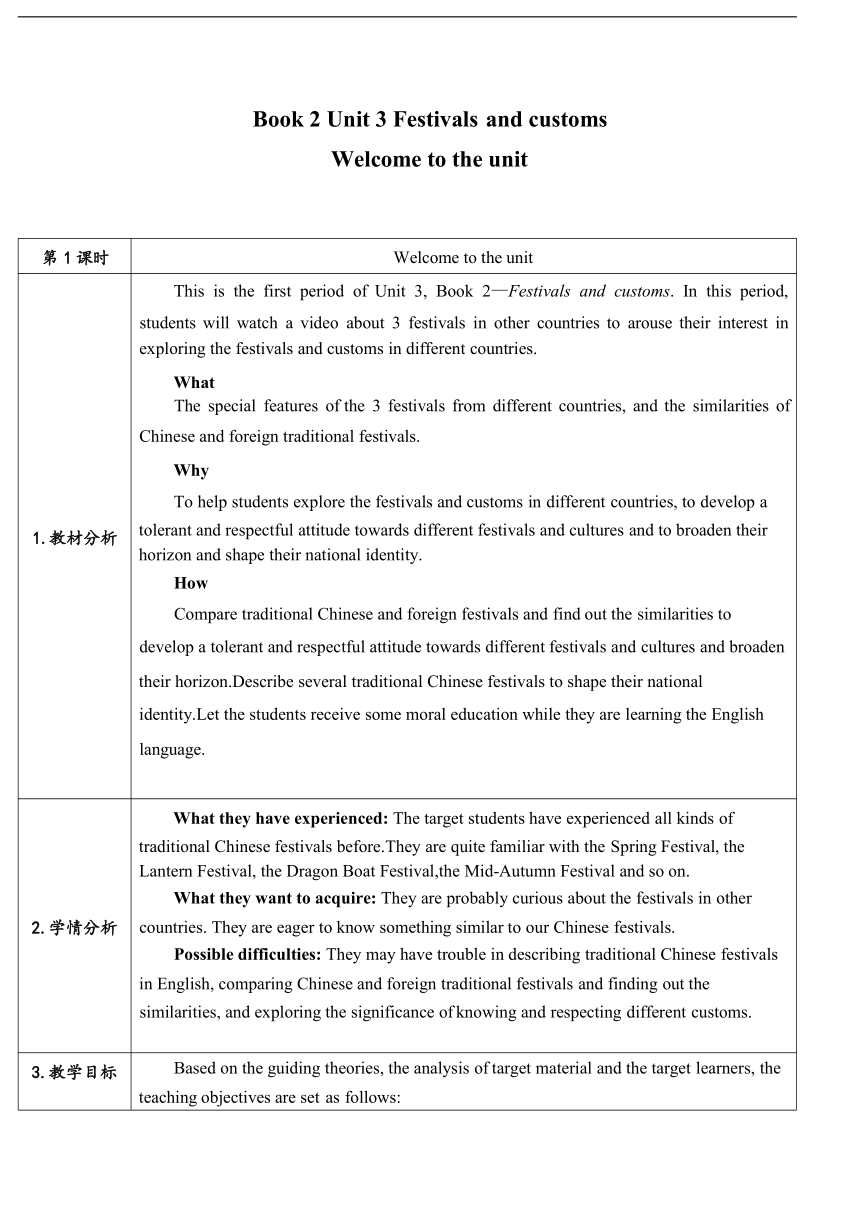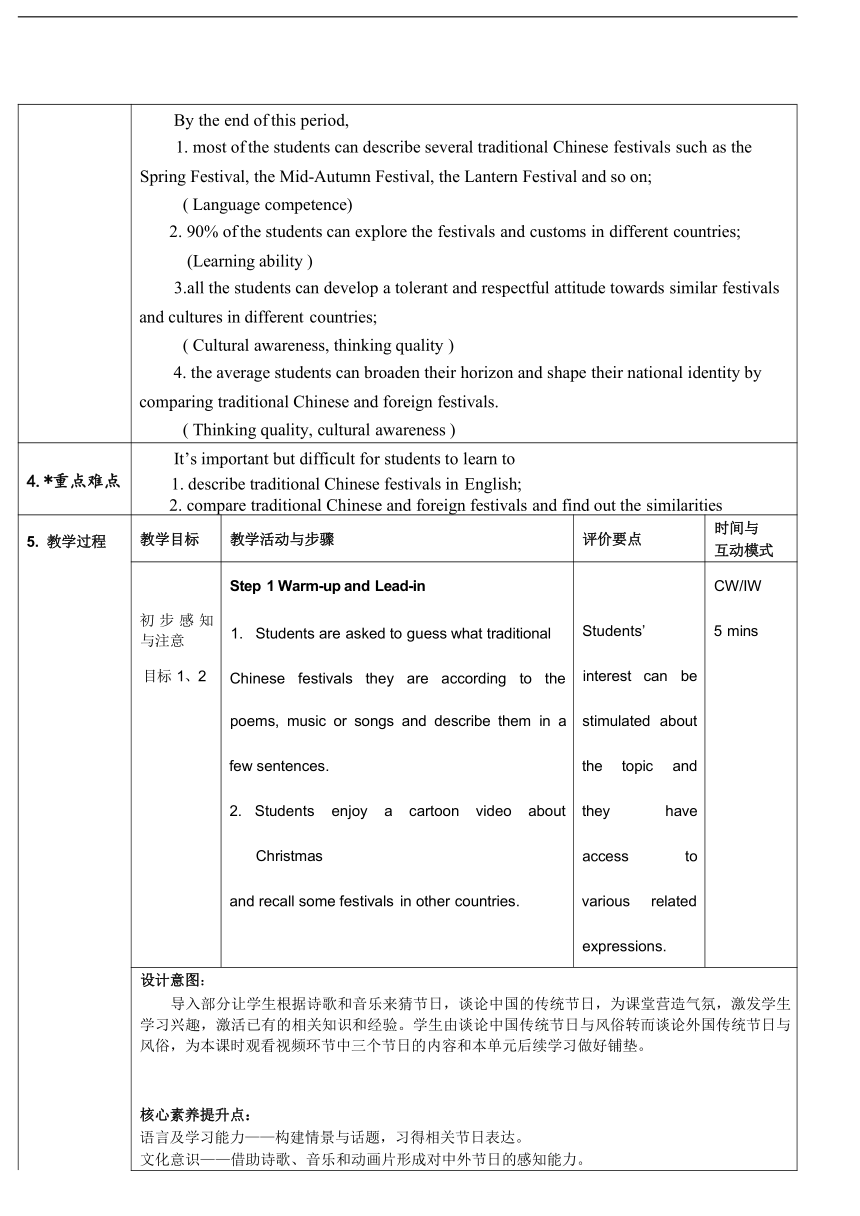牛津译林版(2019)必修 第二册Unit 3 Festivals and customs Welcome to the unit 教学设计(表格式)
文档属性
| 名称 | 牛津译林版(2019)必修 第二册Unit 3 Festivals and customs Welcome to the unit 教学设计(表格式) |  | |
| 格式 | docx | ||
| 文件大小 | 90.6KB | ||
| 资源类型 | 教案 | ||
| 版本资源 | 牛津译林版(2019) | ||
| 科目 | 英语 | ||
| 更新时间 | 2024-04-06 12:23:57 | ||
图片预览



文档简介
Book 2 Unit 3 Festivals and customs
Welcome to the unit
第 1 课时 Welcome to the unit
1.教材分析 This is the first period of Unit 3, Book 2—Festivals and customs. In this period, students will watch a video about 3 festivals in other countries to arouse their interest in exploring the festivals and customs in different countries. What The special features of the 3 festivals from different countries, and the similarities of Chinese and foreign traditional festivals. Why To help students explore the festivals and customs in different countries, to develop a tolerant and respectful attitude towards different festivals and cultures and to broaden their horizon and shape their national identity. How Compare traditional Chinese and foreign festivals and find out the similarities to develop a tolerant and respectful attitude towards different festivals and cultures and broaden their horizon.Describe several traditional Chinese festivals to shape their national identity.Let the students receive some moral education while they are learning the English language.
2.学情分析 What they have experienced: The target students have experienced all kinds of traditional Chinese festivals before.They are quite familiar with the Spring Festival, the Lantern Festival, the Dragon Boat Festival,the Mid-Autumn Festival and so on. What they want to acquire: They are probably curious about the festivals in other countries. They are eager to know something similar to our Chinese festivals. Possible difficulties: They may have trouble in describing traditional Chinese festivals in English, comparing Chinese and foreign traditional festivals and finding out the similarities, and exploring the significance of knowing and respecting different customs.
3.教学目标 Based on the guiding theories, the analysis of target material and the target learners, the teaching objectives are set as follows:
By the end of this period, 1. most of the students can describe several traditional Chinese festivals such as the Spring Festival, the Mid-Autumn Festival, the Lantern Festival and so on; ( Language competence) 2. 90% of the students can explore the festivals and customs in different countries; (Learning ability ) 3.all the students can develop a tolerant and respectful attitude towards similar festivals and cultures in different countries; ( Cultural awareness, thinking quality ) 4. the average students can broaden their horizon and shape their national identity by comparing traditional Chinese and foreign festivals. ( Thinking quality, cultural awareness )
4.*重点难点 It’s important but difficult for students to learn to 1. describe traditional Chinese festivals in English; 2. compare traditional Chinese and foreign festivals and find out the similarities
5. 教学过程 教学目标 教学活动与步骤 评价要点 时间与 互动模式
初 步 感 知 与注意 目标 1、2 Step 1 Warm-up and Lead-in 1. Students are asked to guess what traditional Chinese festivals they are according to the poems, music or songs and describe them in a few sentences. 2. Students enjoy a cartoon video about Christmas and recall some festivals in other countries. Students’ interest can be stimulated about the topic and they have access to various related expressions. CW/IW 5 mins
设计意图: 导入部分让学生根据诗歌和音乐来猜节日,谈论中国的传统节日,为课堂营造气氛,激发学生 学习兴趣,激活已有的相关知识和经验。学生由谈论中国传统节日与风俗转而谈论外国传统节日与 风俗,为本课时观看视频环节中三个节日的内容和本单元后续学习做好铺垫。 核心素养提升点: 语言及学习能力——构建情景与话题,习得相关节日表达。 文化意识——借助诗歌、音乐和动画片形成对中外节日的感知能力。
Step 2 Experience by watching the video IW/CW
6.板书设计
7.作业布置 Homework 1. Search on the Internet to find about the different festivals at home and abroad and think what festival has the most surprising customs. Suppose you were in that country, what would you do 2. Preview the passage on Pages 30–31.
8.教学反思 教学反思 1. Achieving the lesson objectives: at the end of the class, students were able to explore the festivals and customs in different countries,compare Chinese and foreign traditional festivals and find out the similarities to develop a tolerant and respectful attitude towards different festivals and cultures and broaden their horizon. They were also able to describe several traditional Chinese festivals to shape their national identity. 2. Shining points of this class:in this period, I designed a series of activities to help students explore different festivals in which all the students were fully involved. Besides, students were
provided with an opportunity to complete different activities in pairs, groups or individually. 3. What to improve: some students couldn’t describe traditional Chinese festivals in English well. 4. How to improve: maybe I can input more expressions before class next time.
Welcome to the unit
Worksheet
1. Watch the video and fill in the blanks.
Festivals can tell us a lot about the cultures of different countries. Watch the video
and finish the following exercises.
Yi Peng Lantern Festival(义蓬灯节) is celebrated in Chiang Mai, Thailand as a way
to .
Midsummer's Day(仲 夏 节 ) is celebrated in Sweden for people to
.
The Day of the Dead(亡灵节), which lasts , is a festival in Mexico for people to
2.Campare similar foreign and Chinese festivals and complete the table.
3.Critical thinking
What is your attitude to foreign customs and traditions
What is your attitude to Chinese customs and traditions
4.Interview
The English Club of our school is going to make a survey on students’ attitudes towards festivals in China and other countries.
You are a member of the club. And you are going to interview some of your schoolmates for their opinions and attitudes.
Example
Interviewer: Hello, I am … from English Club. Our club is going to make a survey on students’ attitudes towards festivals in China and other countries. Would you like to spare some time for my questions
Interviewees: OK! No problem.
Interviewer: There are many festivals all over the world. Which one do you like best
Interviewee 1: My favorite Chinese festival is the Spring Festival.
Interviewer: Could you tell me the reason
Interviewee 1: Because we can visit relatives, eating a lot of delicious food, and enjoy family reunions. People are all very happy.
Interviewer: Thank you very much. What about you
Interviewee 2: …
Interviewer: Thank you. What’s your attitude towards foreign festivals
Interviewee 3: … .
5.Discussion:
Why do we have so many festivals every year
How can we know more about festivals and customs around the world
6. Self-assessment
Welcome to the unit
第 1 课时 Welcome to the unit
1.教材分析 This is the first period of Unit 3, Book 2—Festivals and customs. In this period, students will watch a video about 3 festivals in other countries to arouse their interest in exploring the festivals and customs in different countries. What The special features of the 3 festivals from different countries, and the similarities of Chinese and foreign traditional festivals. Why To help students explore the festivals and customs in different countries, to develop a tolerant and respectful attitude towards different festivals and cultures and to broaden their horizon and shape their national identity. How Compare traditional Chinese and foreign festivals and find out the similarities to develop a tolerant and respectful attitude towards different festivals and cultures and broaden their horizon.Describe several traditional Chinese festivals to shape their national identity.Let the students receive some moral education while they are learning the English language.
2.学情分析 What they have experienced: The target students have experienced all kinds of traditional Chinese festivals before.They are quite familiar with the Spring Festival, the Lantern Festival, the Dragon Boat Festival,the Mid-Autumn Festival and so on. What they want to acquire: They are probably curious about the festivals in other countries. They are eager to know something similar to our Chinese festivals. Possible difficulties: They may have trouble in describing traditional Chinese festivals in English, comparing Chinese and foreign traditional festivals and finding out the similarities, and exploring the significance of knowing and respecting different customs.
3.教学目标 Based on the guiding theories, the analysis of target material and the target learners, the teaching objectives are set as follows:
By the end of this period, 1. most of the students can describe several traditional Chinese festivals such as the Spring Festival, the Mid-Autumn Festival, the Lantern Festival and so on; ( Language competence) 2. 90% of the students can explore the festivals and customs in different countries; (Learning ability ) 3.all the students can develop a tolerant and respectful attitude towards similar festivals and cultures in different countries; ( Cultural awareness, thinking quality ) 4. the average students can broaden their horizon and shape their national identity by comparing traditional Chinese and foreign festivals. ( Thinking quality, cultural awareness )
4.*重点难点 It’s important but difficult for students to learn to 1. describe traditional Chinese festivals in English; 2. compare traditional Chinese and foreign festivals and find out the similarities
5. 教学过程 教学目标 教学活动与步骤 评价要点 时间与 互动模式
初 步 感 知 与注意 目标 1、2 Step 1 Warm-up and Lead-in 1. Students are asked to guess what traditional Chinese festivals they are according to the poems, music or songs and describe them in a few sentences. 2. Students enjoy a cartoon video about Christmas and recall some festivals in other countries. Students’ interest can be stimulated about the topic and they have access to various related expressions. CW/IW 5 mins
设计意图: 导入部分让学生根据诗歌和音乐来猜节日,谈论中国的传统节日,为课堂营造气氛,激发学生 学习兴趣,激活已有的相关知识和经验。学生由谈论中国传统节日与风俗转而谈论外国传统节日与 风俗,为本课时观看视频环节中三个节日的内容和本单元后续学习做好铺垫。 核心素养提升点: 语言及学习能力——构建情景与话题,习得相关节日表达。 文化意识——借助诗歌、音乐和动画片形成对中外节日的感知能力。
Step 2 Experience by watching the video IW/CW
6.板书设计
7.作业布置 Homework 1. Search on the Internet to find about the different festivals at home and abroad and think what festival has the most surprising customs. Suppose you were in that country, what would you do 2. Preview the passage on Pages 30–31.
8.教学反思 教学反思 1. Achieving the lesson objectives: at the end of the class, students were able to explore the festivals and customs in different countries,compare Chinese and foreign traditional festivals and find out the similarities to develop a tolerant and respectful attitude towards different festivals and cultures and broaden their horizon. They were also able to describe several traditional Chinese festivals to shape their national identity. 2. Shining points of this class:in this period, I designed a series of activities to help students explore different festivals in which all the students were fully involved. Besides, students were
provided with an opportunity to complete different activities in pairs, groups or individually. 3. What to improve: some students couldn’t describe traditional Chinese festivals in English well. 4. How to improve: maybe I can input more expressions before class next time.
Welcome to the unit
Worksheet
1. Watch the video and fill in the blanks.
Festivals can tell us a lot about the cultures of different countries. Watch the video
and finish the following exercises.
Yi Peng Lantern Festival(义蓬灯节) is celebrated in Chiang Mai, Thailand as a way
to .
Midsummer's Day(仲 夏 节 ) is celebrated in Sweden for people to
.
The Day of the Dead(亡灵节), which lasts , is a festival in Mexico for people to
2.Campare similar foreign and Chinese festivals and complete the table.
3.Critical thinking
What is your attitude to foreign customs and traditions
What is your attitude to Chinese customs and traditions
4.Interview
The English Club of our school is going to make a survey on students’ attitudes towards festivals in China and other countries.
You are a member of the club. And you are going to interview some of your schoolmates for their opinions and attitudes.
Example
Interviewer: Hello, I am … from English Club. Our club is going to make a survey on students’ attitudes towards festivals in China and other countries. Would you like to spare some time for my questions
Interviewees: OK! No problem.
Interviewer: There are many festivals all over the world. Which one do you like best
Interviewee 1: My favorite Chinese festival is the Spring Festival.
Interviewer: Could you tell me the reason
Interviewee 1: Because we can visit relatives, eating a lot of delicious food, and enjoy family reunions. People are all very happy.
Interviewer: Thank you very much. What about you
Interviewee 2: …
Interviewer: Thank you. What’s your attitude towards foreign festivals
Interviewee 3: … .
5.Discussion:
Why do we have so many festivals every year
How can we know more about festivals and customs around the world
6. Self-assessment
